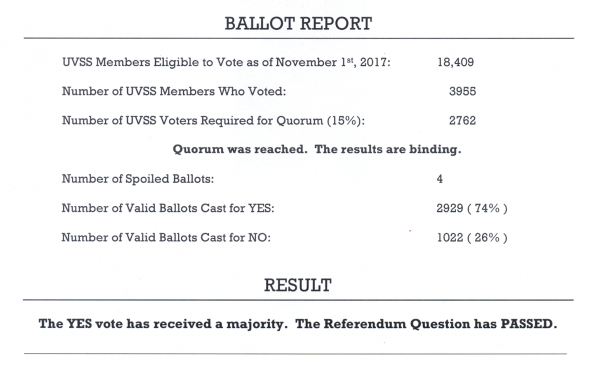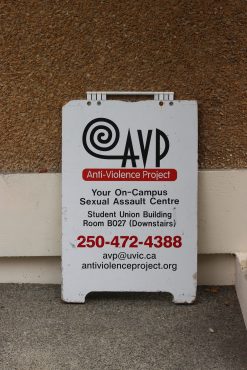Full-time student fees will increase by $2 in funding towards the advocacy group
Students have voted in favour of increasing the student fee allocation for the Anti-Violence Project (AVP), UVic’s on-campus sexual assault centre.
In a vote that took place between Nov. 8 and 10, 3 955 students voted on the question of a 100 per cent increase to funding for the AVP ($2 per semester for full-time students, $1 for part-time students). The 21 per cent voter turnout rate was the highest since 2013.

The numbers from the Anti-Violence Project referendum. Photo via UVSS Elections
74 per cent of votes cast (2 929 students) were in favour of the increase — the first time AVP has had its student fee funding increased since 1998 when it received its first fee levy from students.
“We are just overjoyed,” said Kenya Rogers, a volunteer with the AVP and the official proponent of the referendum. “I really hope that students who voted really recognize that they were playing a role in creating a different type of community on campus.”
The AVP provides workshops and support for students, staff, faculty, and community members regarding sexualized violence.
Their consent workshops focus on providing a better understanding of sexualized and gender-based violence and how to cultivate a culture of consent in all relationships. Their support workshop provides support to individuals who have experienced sexualized or gender-based violence. The AVP also provides confidential drop-in support resources and services for people who have experienced violence, and for their friends/supporters.
Rogers said the additional funds allow AVP to widen the scope of their work.

Photo by Cormac O’Brien, Editor-in-Chief
“We’re going to be able to sit down and really start planning what we can do on campus and what areas we can expand on,” Rogers said. This semester, the AVP has seen a spike in students accessing their support hours and all of their consent workshops are full. “I think for the first time in a really long time AVP is in a position where we can plan ahead instead of just having to make [do with] what we have.”
Referenda results in the past five years have been a mixed bag. Out of 12 questions posed since 2012, seven have passed and five have failed. Of the referenda that failed to pass, two referenda questions — both from spring 2017 — failed to hit quorum.
The high turn-out is a particular source of joy for Rogers.
“Maybe it felt like a small action to go and take the time to vote, but it is part of something much bigger,” Rogers said. “I’m so grateful that our campus took it seriously and supported us.”
Files by Angel Manguerra






